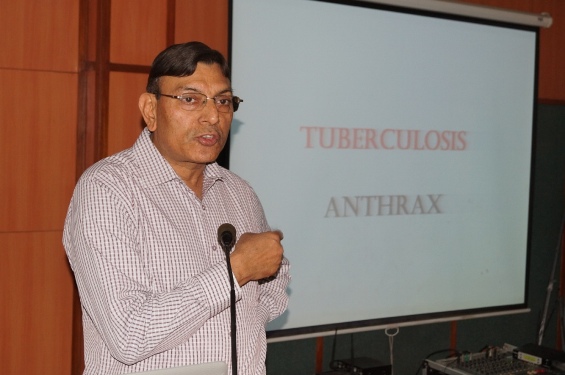26 Mar 2014|Noida | Amity University Campus, Sector-125 Noida
Amity Institute of Microbial Technology organizes American Society for Microbiology Workshop

American Society for Microbiology (ASM) Workshop was organized by Amity Institute of Microbial Technology at Amity University, Sector-125. Prof. Rup Lal, American Society for Microbiology Ambassador – Indian Ocean Region, Dr. Yogendra Singh, Institute of Genomics & Integrated Biology – Council of Scientific and Industrial Research, Dr. V.C. Kalia, Institute of Genomics & Integrated Biology presented lectures based on microbes and bacteria. The session was followed by virtual lecture by Dr. Tim Miller - American Society for Microbiology on the topic “Art of Science Communication”
Dr. Ajit Varma, Advisor – Amity Institute of Microbial Technology welcomed the scientists from CISR and ASM and said that microbial studies is a very dynamic and vast subject in which lots of research work is going on. Dr. Varma said that it is the privilege for students to participate and listen to the eminent scientists in this workshop which will help in their future endeavors.
Dr. Yogendra Singh, CSIR – Institute of Genomics & Integrated Biology presented his lecture on “Combating Tuberculosis & Anthrax: Are we failing?” and said that large number of people are suffering from tuberculosis in the world. He stated that 20 years ago persons suffering from TB were less and most were treated but in last 10 years many patients do not get treated due to the drug resistance. Dr Singh said that diagnosis is another problem since TB bacteria grows very slow and there are very few new drug discoveries. A new drug “Bedoquiline” is available only in US and will take some time to be available in India. Dr. Singh commented that last month India became Polio free nation which was possible because of vaccines available for polio but for TB, there are still no vaccines discovered. Dr Singh elaborated that in TB there are four major drugs “Isoniazid, Ethanbutol, Rifampicin and Pyrazinamide” which are given to TB patients, but all these drugs were discovered more than 60 years ago and now TB bacteria had become drug resistant. Speaking on Anthrax, Dr. Singh said that it is used in biological war caused by bacillus anthracis bacteria. The spore of this bacteria is highly stable and can be stored for hundred years and can be again germinated. There are vaccines available for anthrax but it spreads very fast in the affected area.
Prof. Rup Lal, American Society for Microbiology Ambassador – Indian Ocean Region presented his lecture on Metagenomics and said it is the application of modern genomics techniques to the study of communities of microbial organisms directly in their natural environment. It is done by sapling, filtration by size, DNA extraction, Cloning, Sequencing etc. Prof. Lal stated only 0.5 percentage of organism have been cultures. He said that human body contains 1 trillion cells and when bacteria enter, cells increased upto 3 trillions to fight those bacteria. At any given time, one human body contains nearly 3 pound of bacteria load always. Prof. Lal said that in a molecular biology, the current research focuses on:
- Genetic manipulation of the gene clusters
- Sequencing of bacterial genomes and comparative genomics
- Metagenomics
- Taxanomical characterization of novel bacterial species.
A short virtual speech by Dr. Tim Miller on the topic “Art of Science Communication” was presented during the workshop. Dr. Miller emphasized that it is no longer to have great ideas but to communicate it to wider audience. A good impact statement should have three points – Specific, Achievable and Measurable. Dr Miller identified keys to be effective speaker which are:
- Identifying target audience and the language used by them
- Level of knowledge of subject by audience
- How audience care about the topic
- Prepare good posters and slides for better understanding by audience.
Dr. Miller also emphasized on preparing scientific posters and said that posters contain lots of content and provide a snapshot of particular project. Posters are viable as it increases face to face communication between you and colleagues.
Dr. V.C. Kalia, CSIR – Institute of Genomics & Integrated Biology presented his lecture on “Microbes, Antimicrobials and resistance: The battle goes on” and said that bacteria are known to cause diseases and antibiotics was sought to kill all bacteria. He added that after every 10 years, bacteria become resistant to antibiotics which now resulted in multi drug resistant bacteria. Dr. Kalia said that bacteria is always present and keeps multiplying in human body and one takes notice of bacterial cells only when one is infected by a disease. Dr. Kalia elaborated broad types of bacteria like Skin Microbiota - Bacteria found in skin and Gut Microbiota – Bacteria inside the body.
Scientists, faculty from Amity Institute of Biotechnology, Amity Institute of Microbial Technology and Amity Institute of Applied Sciences were present during the session.